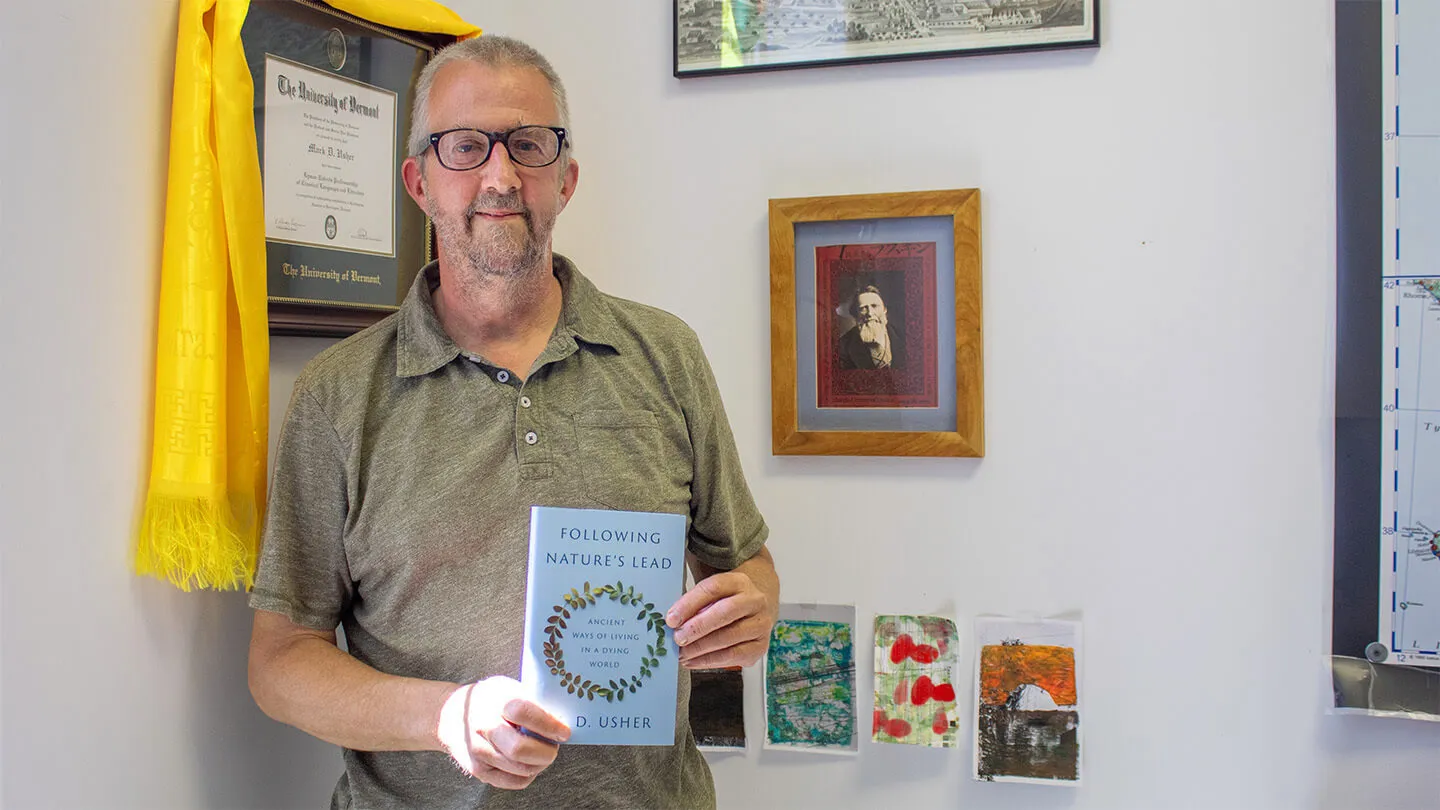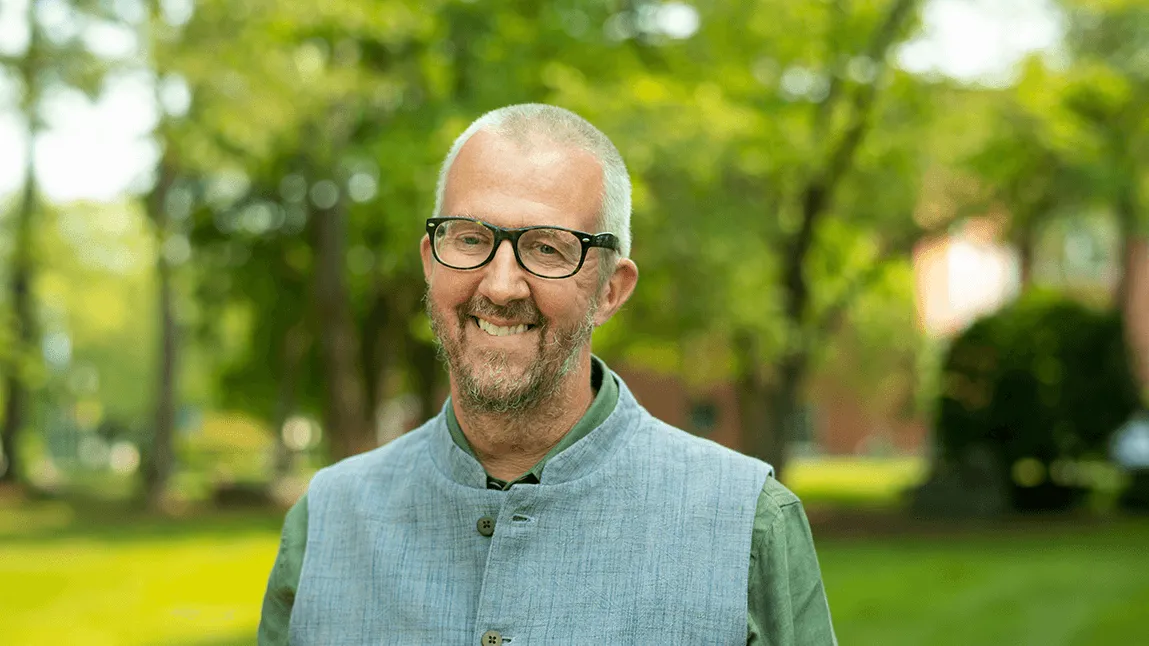A decade ago, Mark Usher, Lyman-Roberts Professor of Classical Languages and Literature in the UVM College of Arts and Sciences, was invited to become a Sustainability Fellow here at the university. “In the program we were reading about food systems, de-growth, and other ideas that were being touted as new but sounded a lot like ideas from Aristotle, Plato, and the Stoics,” Usher says. “That led me to think that I could marry my avocation—my wife, Caroline, and I have a small farm and strive to live close to nature—with my vocation, teaching and writing.”
That marriage of callings is what led to Usher’s new book, Following Nature’s Lead: Ancient Ways of Living in a Dying World, published by Princeton University Press earlier this month. We sat down with Usher to talk with him about what the great pre-modern thinkers can teach us about the importance of cultivating a sustainable, respectful relationship with nature.
CAS: The ancients extolled the importance of “following nature’s lead.” What did that mean to them?
MU: They had a cyclical view of nature, that giving back is crucial to self-preservation. Every school of ancient philosophy was concerned with living according to nature and considered it a matter of ethics. Ethics is based on our understanding of how to behave in a way that is consistent with the way the world is put together. Because we live in a physical world—one with limits, certain realities, and laws of nature—we should never act against those givens. The ancients held this as the premise of all ethical action. In the modern world, we have gotten away from that. We need to get back in touch with nature in order to be able to live in any sort of sane, sustainable way.
CAS: Why is it so important in current times to live in harmony with nature?
MU: We’ve become so alienated from nature and seem to work against it at every turn. The advances in our world give us the capacity to live in bubbles that allow us to forget about the natural world. The ancients had a better sense of limits, perhaps because they couldn’t defy them to the extent that we can. But we need to be careful, because all bubbles burst. The resources we rely on are finite, and we are now causing physical harm to the planet that may be irreparable.
CAS: Why is Lucretius’s scientific theory that “nothing comes from nothing or returns to nothing” so important?
MU: Lucretius was an Epicurean, who held the belief that the world is a closed-loop system in which all things that arise are made up of pre-existing things, and that when things die, they’re reabsorbed to yield new things. This informed the Epicureans’ ethos regarding how we should think about and live in the world, and how we should treat the world and each other. For them, there was no worry about death or punishment afterward, because when you die you’re just composted. The economy of nature and how nature works provides a good model for a human economy that’s regenerative and distributive. “Following nature’s lead” is a good operating principle for understanding how we should live and make decisions.
CAS: You talk about the need for modern civilization to attain different values in order to modify our behavior when it comes to our interaction with nature. What can the ancients teach us in that regard?
MU: Ancient philosophers recognized the need to observe limits. Aristotle said there should be a limit to all wealth, for example, that the exponential growth of wealth is contrary to nature—that is, contrary to the purpose of money, which is as a token of exchange only. An economy (an “oikonomia,” or "household"), he said, cares more for its human persons than it does about its material possessions. Lucretius, from his perspective as an Epicurean, said nature itself observes limits and doesn't overstep its own bounds. Heraclitus said the same, adding that the ancient version of the bogey man, the Erinyes, will come to correct transgressors (literally, "those who cross a prescribed boundary"). So, above all, I would say the ancients teach us to respect limits, especially in terms of growth.
CAS: What can we learn from nature in terms of dealing with climate trauma?
MU: While nature does its thing without regard to us, we can take some comfort in observing that it is resilient. It bounces back. After a catastrophic event like, say, Krakatoa, or Mount St. Helens, or fires like we've seen recently in Maui and L.A., what comes back is different, but it comes back. Humans can bounce back too, psychologically and materially, but hopefully with a deeper, more prudent respect for natural limits and the power that nature can wield. Seneca wrote about the fire that destroyed the Roman city of Lyon in 64 CE, saying, in essence, that the lesson of Lyon is that growth proceeds incrementally, but ruin comes all at once. Therefore, we should expect the unexpected and be ready for it, not deluded by some temporary affluence or ease in the present. He also said that a catastrophe often makes room for even greater flourishing. That seems hopeful to me
CAS: What are you hoping readers will take away from this book?
MU: There’s hope in being happy with what you have—though it may require a reorientation of how we understand our place in space and time. We are not the most important species on this planet, and right now is not the most important time. The past also counts, as does the future. So, if we really want to understand what it means to be human and how we should interact, there’s a benefit to looking at the past and seeing how pre-modern people lived in the world, when there was a different way of framing the human relationship to the environment. I hope readers come away thinking they had some good ideas back then.

